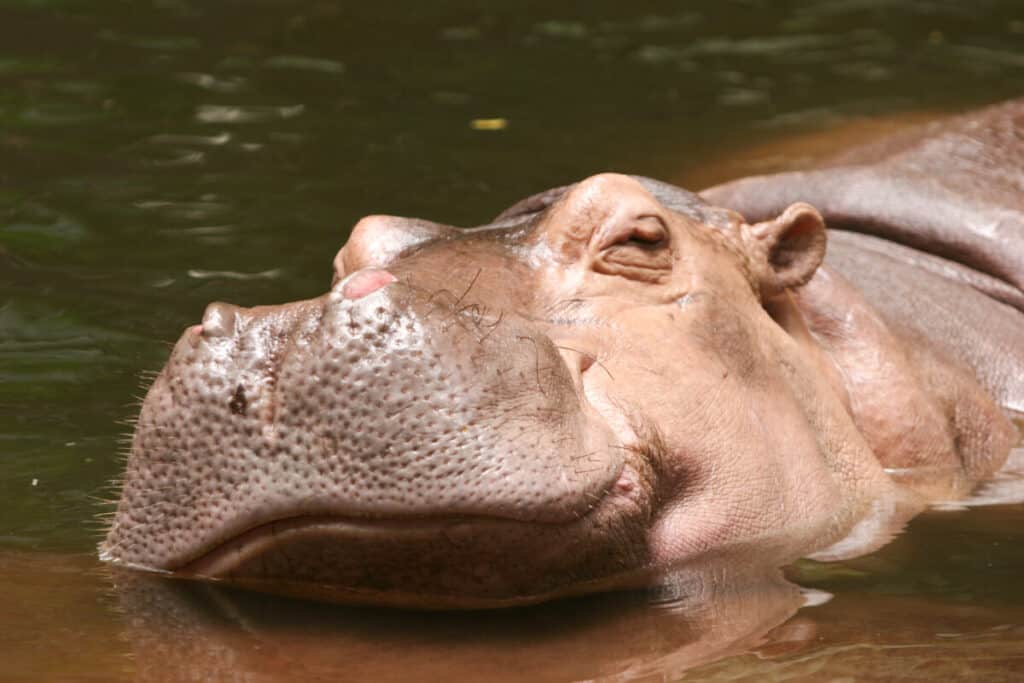Hippopotamuses are large, semi-aquatic mammals found throughout Sub-Saharan Africa. They inhabit rivers and lakes, as well as swamps and floodplains, where they graze on grasses and other vegetation.
As such, it is important to understand the senses of hippos in order to better comprehend their behavior and ecology. This article seeks to explore what sensorimotor capabilities these animals possess in order to interact with their environment.
The sensory systems of hippos have been studied extensively by biologists over the years. Specifically, research has focused on identifying which sensory organs are present, how acute each sense is, and the role that different senses play in behaviors such as foraging or mating rituals.
Further analysis will be conducted in this article regarding how these senses might aid hippo species in surviving within their habitats.

Sight
Hippos are well known for their superior sight. They have a unique ability to navigate the murky waters of rivers and swamps, even in the dark. This is attributed to the adapted vision that hippos possess; they mainly use monocular rather than binocular vision when assessing distances or obstacles.
Night time navigation is made possible by the presence of an unusually large number of rods within the eye, which give them excellent low-light capabilities as well as peripheral vision. In addition, hippos have a wide field of view – up to around 300 degrees without having to move its head – allowing them to spot potential predators from afar.
The eyes themselves are located on either side of the head and can be retracted into pockets beneath protective eyelids during moments of extreme danger or while underwater. The pupils also feature concentric circles which allow for precise focusing on objects near and far away, enhancing their depth perception further still when navigating dense aquatic environments.
Hippos’ eyes contain a membrane filled with reflective crystals called Tapetum Lucidum, responsible for increasing light sensitivity at night times. Overall, these adaptations provide hippos with greater control over their environment and help ensure their survival in all types of conditions.
How Big Are Hippos: Unveiling the Size of Aquatic Mammals
Hearing
Hippos possess a highly developed sense of hearing. While they primarily rely on their eyesight while above the water, hippos have an even greater reliance on auditory cues in underwater environments.
Underwater hearing allows these large mammals to detect potential danger and communicate with one another efficiently over long distances.
Some key characteristics of a hippo’s hearing include:
- The ability to hear low-frequency vocalizations made underwater by other hippos up to 1 km away;
- An enhanced sensitivity for detecting subtle movements in the environment through ambient noise;
- A heightened awareness when it comes to recognizing environmental changes such as fluctuations in temperature or pressure.
These senses are essential for survival, allowing hippos to remain vigilant against predators and navigate their aquatic surroundings more easily. Hippos use this combination of sight and sound to maintain contact with members of their herd and stay safe from harm in their natural habitat.
Hippo Behavior: Unveiling the Intriguing Habits
Smell
Hippos are equipped with an excellent sense of smell, which they use to detect social signals and monitor mating habits. This is evidenced by the fact that hippopotamuses have a large area devoted to their olfactory system in the brain, indicating its important role for the species.
Hippos can smell up to 5 km away due to their acute sensory organs located within their nostrils. The information gained from scent helps guide behaviours such as mating rituals between males and females. In addition, it is thought that female hippos emit pheromones when ready to mate; these serve as a signal for males who may be nearby.
Furthermore, females also tend to travel further distances than usual while looking for a suitable partner. This heightened sense of smell is vital for survival in multiple ways: It allows them to communicate with one another without making any noise (which may alert potential predators) and keeps groups together – helping ensure protection against danger or threats from other animals. Additionally, it provides clues about food sources and helps locate mates during breeding season.
Unveiling the Marvels of Hippopotamus: Nature’s Mighty River Guardians
Taste
Hippos possess a diverse range of senses, including taste. But how does this sense work for them? How do hippos use their sense of taste to detect prey or find food preferences in the wild?
The tongues and lips of hippos are well adapted to tasting different foods; they have numerous papillae on both surfaces that aid in detection and manipulation. The tongue is also covered with peg-like denticles which give it a rough texture. This helps the animal discern between different tastes as the surface interacts with various objects in its environment.
Hippos can also adjust their saliva production depending on what type of food they’re consuming, allowing them to better process flavors.
In terms of detecting prey, hippos rely heavily on smell and hearing while searching for potential meals. However, they still make use of taste when searching for certain types of plants or browsing through aquatic vegetation near rivers and lakes. Additionally, their sense of taste allows them to determine whether something is edible or not by examining bitter compounds found in some species’ leaves or fruits.
As far as food preferences go, most hippopotamuses prefer grasses although other succulent plants like water lilies also make up part of their diets.
From discerning sweet from salty to determining if something is safe enough to eat: the sense of taste works hand-in-hand with other senses in order to help hippos survive in the wild.
Hippo Behavior: Exploring the Fascinating Aquatic Behaviors
Touch
Sight is their main sense, allowing them to detect other animals in the water from a distance as well as interpret visual cues from others. They can also see under water clearly.
Hearing is another important sense; hippos rely on vocalizations for communication with conspecifics and detecting predators or prey.
Hippos have excellent tactile abilities which enable them to feel objects around them underwater without needing to look at it directly. This helps them identify potential threats and find food sources located beneath the surface of the water.
Olfactory senses are thought to be not very developed in hippos but they do possess vomeronasal organs which may play some role in chemical communication between individuals. It has been suggested that this could help explain some of their social behaviors such as mating rituals.
The primary use of touch by hippos involves physical contact during aggressive interactions within its species–including biting, scraping, and pushing against one another–to establish dominance hierarchies among males and females alike.
Hippopotamuses and Their Natural Adversaries: Unmasking the Predators
Balance & Coordination
The hippopotamus is an impressive creature with highly developed senses.
A fascinating statistic related to its balance and coordination is that a hippo can turn around in the same spot without moving its feet or legs. This remarkable ability enables them to move swiftly through the water, even maneuvering between rocks or other obstructions.
Hippos have excellent vision both during the day and at night, allowing them to navigate their aquatic environment easily. They use this keen insight for hunting prey like large fish and shrimp as well as alerting themselves of potential dangers such as crocodiles lurking nearby.
Additionally, Hippos are capable of detecting vibrations on land or in the water from up to 5 miles away due to their sensitive hearing. These animals also possess an acute sense of smell which helps them identify predators and locate food sources when needed.
Along with a heightened sense of taste, Hippos rely heavily on these five primary senses for survival in their habitat – making them one of Africa’s most formidable creatures.
Hippo Behavior: Unveiling the Intriguing Habits

Magnetic Sense
Hippos possess an ability to sense magnetic fields. This has been observed in their migratory behavior, as some populations migrate thousands of miles each year with minimal deviation from their intended routes.
Detailed studies have documented that hippos can detect fluctuations in the Earth’s magnetic field and use this information for navigation during long-distance movements. Hippopotamuses are likely capable of detecting even subtle changes in magnetism between different geographical regions or bodies of water.
The mechanism behind the detection of magnetic fields is still unknown; however, it is thought that a sensory organ located near the snout may be involved. The lower lip contains numerous small nerve fibers which could potentially function as a specialized receptor sensitive enough to detect variations in the planet’s magnetic field.
It is also possible that hippos experience something akin to synesthesia when perceiving these minute differences, forming mental images based on visual cues associated with varying levels of magnetism along their journey.
Research into how precisely hippos perceive and utilize magnetic fields continues today and will hopefully provide further insight into this remarkable talent shared by only few species among mammals.
Hippo Lifecycle: From Birth to Dominant Hippopotamus
Conclusion
Hippopotamuses are fascinating animals that possess a variety of senses.
Sight, hearing, smell, taste, touch, balance and coordination, and magnetic sense all contribute to the ability of hippos to survive in their environment; however, some senses are more developed than others.
For example, research has shown that hippos have an incredibly acute sense of hearing – they can detect sound frequencies as low as 14 Hz up to 35 kHz! This is remarkable considering humans only hear sounds between 20Hz and 20kHz.
Hippos also demonstrate incredible tactile sensitivity due to the number of nerve endings present on their skin. They use this sense to regulate their body temperature and protect themselves from predators.
In conclusion, the range of sensory capabilities possessed by hippopotamuses makes them truly remarkable creatures worthy of further study.
Unveiling the Secrets of Hippo Behavior: Dive into the World of Hippos

